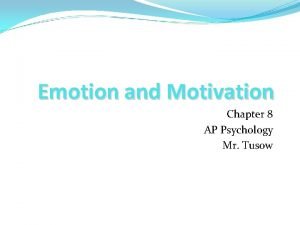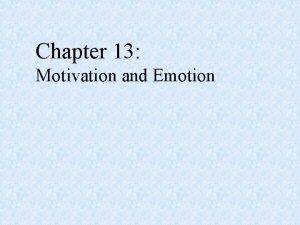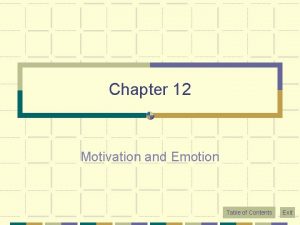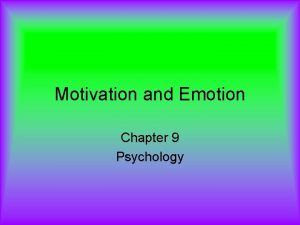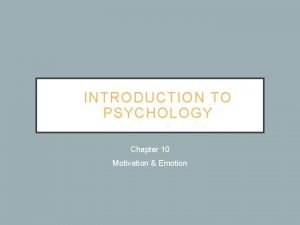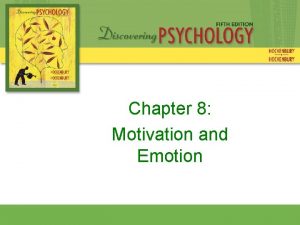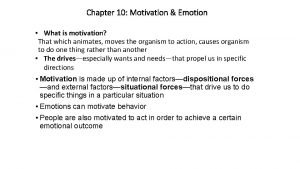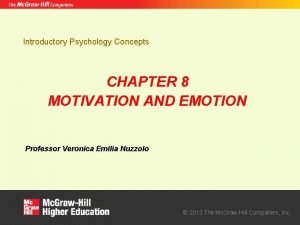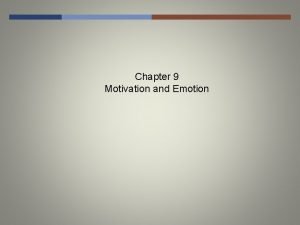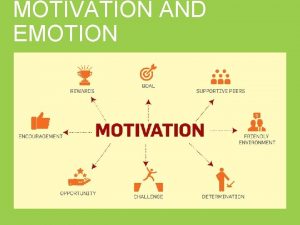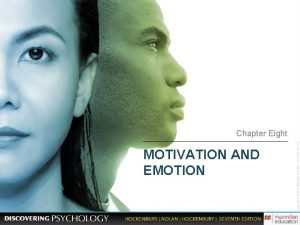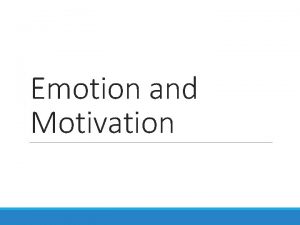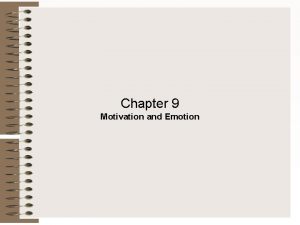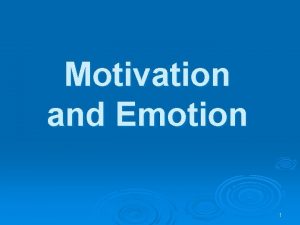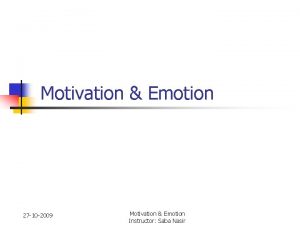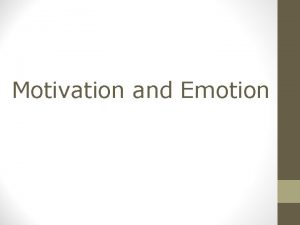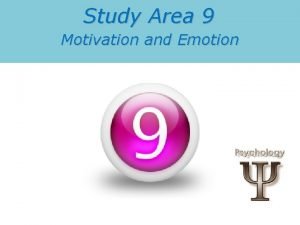CHAPTER 44 MOTIVATION EMOTION EMOTION IN DETAIL PRESENTED










- Slides: 10

CHAPTER 44 MOTIVATION & EMOTION: EMOTION IN DETAIL PRESENTED BY: JULIENE DURAN PAEZ

SURVEY QUESTIONS: • What physiological changes underlie emotion, and can “lie detectors” really detect lies? • How accurately are emotions expressed by the face and “body language”? • How do psychologists explain emotions?

1. PHYSIOLOGY & EMOTION-AROUSAL & LYING • Emotions (fear, excitement, worriedness etc. ) >>> Sweating, pounding heart, restlessness, sensitivity to loud noises and other body changes. • These body changes are caused by the Autonomic Nervous System • Autonomic Nervous System: The system of nerves that connects the brain with the internal organs and glands, ANS is also Automatic • Sympathetic Branch: A part of the Autonomic Nervous System that activates the body at times of stress • Parasympathetic Branch: A part of the Autonomic Nervous System that calms and relaxes the body for instance after stress • Example: Getting scared

AUTONOMIC NERVOUS SYSTEM

LIE DETECTORS • Lie Detectors/Polygraph (many writings): A device for recording heart rate, blood pressure, respiration, and galvanic skin response • These devices are mostly used by the police to detect if a suspect is telling the truth or lying • In some cases it occurs that the polygraph tests can be failed, it depends on the questions that are asked during the process • Guilty Knowledge test: Polygraph procedure involving testing people with knowledge only a guilty person could know • Example: Killing someone with a gun • There is also another effective method to detect if someone is telling the truth or not, Functional Magnetic Resonance Imaging (FMRI)

EMOTION & BRAIN • Amygdala (part of the Limbic system): Within the brain that produces fear responses • Example: People who suffer from phobias and anxiety often feel afraid without knowing why • Damage in the amygdala >>> the person becomes “blind” to emotion • “Two-layer” Processing: Positive and negative emotions at the same time • Example: Feel very afraid and yet Think you have nothing to be afraid of Positive emotions Negative Emotions

2. EXPRESSING EMOTIONS-MAKING FACES AND TALKING BODIES • Facial Expressions • Cultural Differences in Expressing Emotions • Gender Differences in Expressing Emotions - Alexithymia: A difficulty expressing emotions; more common in men • Body Language - Kinesics: Study of meaning of body movements, posture, hand, gesture, and facial expressions >> Body language

3. THEORIES OF EMOTION-SEVERAL WAYS TO FEAR A BEAR • The James-Lange Theory: States that emotional feelings follow bodily arousal and come from awareness of such arousal (physical) • The Cannon-Bard Theory: States that activity in the thalamus causes emotional feelings and bodily arousal to occur simultaneously (physical) • Schachter’s Cognitive Theory of Emotion: States that emotions occur when physical arousal is labeled or interpreted on the basis of experience and situational cues (mental)

• Attribution: The mental process of assigning causes to events • Emotional Appraisal: Evaluating the personal meaning of a stimulus or situation • Facial Feedback Hypothesis: States that sensations from facial expressions help define what emotion a person feels

THANK YOU! QUESTIONS?
 Ap psychology chapter 8 emotion and motivation test
Ap psychology chapter 8 emotion and motivation test Chapter 13 motivation and emotion
Chapter 13 motivation and emotion Chapter 12 motivation and emotion
Chapter 12 motivation and emotion Intrinsic and extrinsic motivation
Intrinsic and extrinsic motivation Paul ekman universal facial expressions
Paul ekman universal facial expressions Appraisal psychology meaning
Appraisal psychology meaning Chapter 10 motivation and emotion
Chapter 10 motivation and emotion Chapter 8 motivation and emotion
Chapter 8 motivation and emotion Psychology chapter 9 motivation and emotion
Psychology chapter 9 motivation and emotion Chapter 9 motivation and emotion
Chapter 9 motivation and emotion Main idea major and minor supporting details
Main idea major and minor supporting details
